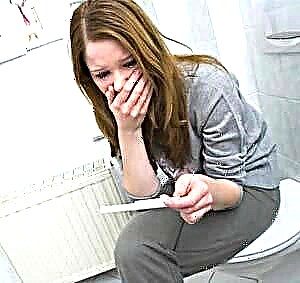
The temperature that rises in a baby during the first months of life always causes alarm among parents. Should I immediately run to the pharmacy for an antipyretic agent, what medications are allowed for such young children and what is important to know about their use?
When is it worth bringing down the temperature?
Parents should be aware that the temperature response of newborns is different from that of older children. In a baby in the first months of life, the temperature can rise very quickly and under the influence of various factors. The temperature in an infant of this age should be brought down when it rises above + 38 ° C. You should also take into account the general condition of the baby.
It is very important not to act independently, but to immediately call a doctor if the child has any congenital pathologies, especially if they concern the nervous system and heart.

Why shouldn't you lower the low temperature?
An increase in temperature is often the body's response to bacteria and disease-causing viruses entering it. This reaction includes not only a rise in temperature, but also the production of protective proteins called interferons. In addition, the high temperature prevents the growth of harmful microorganisms. The result will be the formation of immunity and faster healing.
If the temperature of the crumbs has not exceeded + 38 ° C, and the baby's condition has not deteriorated much, it is worth postponing the use of antipyretic drugs.
When can you do without antipyretic?
In young children, the susceptibility to chemicals is increased, so it is quite understandable that parents want to minimize the effect on the body of crumbs of various medications. To determine if taking antipyretic medication can be avoided, you should closely monitor the baby and follow the instructions of the pediatrician.
If a child tolerates an increase in temperature relatively calmly, the thermometer readings do not exceed 38-39 degrees, and there are no aggravating circumstances (heart defects, pathologies of the nervous system, etc.), nothing can be given. But as soon as any deterioration in the baby's condition is noted, urgent action is needed.

Forms
All antipyretics intended for children under one year old are available in the following forms:
- Liquid. For babies 1-3 months, suspensions are produced, and syrups can also be given to babies over 3 months. Easy to dose thanks to the included measuring spoons. The dose of the liquid antipyretic agent is calculated based on the weight and age of the baby.
- Suppositories - candles. They differ in the dosage of the active ingredient, which is indicated on their packaging. Most antipyretic suppositories are prescribed from 3 months of age, but there are drugs with a dosage of 50 mg, designed for babies from 1 to 3 months.
Suspensions and syrups attract not only the ease of use, but also the pleasant smell and taste of the product, however, precisely because of the flavoring and aromatic additives, such drugs are more dangerous for babies, as they have a risk of allergic reactions.
The main advantage of using suppositories is fewer negative effects, because the used suppository is absorbed in the rectum, therefore it will not irritate the digestive tract. The candles do not contain allergy-causing additives, and the effect of this form of the drug is longer. However, as the baby grows, it becomes more difficult to use candles, as the baby begins to protest against such medications.

Popular drugs
A newborn baby can only be given drugs, the active ingredient of which is paracetamol. It should be noted that all these funds are allowed for use in babies older than 1 month, therefore, only a doctor should make a decision on their appointment to a newborn.
Paracetamol will help reduce fever and relieve pain in cases of viral infections, but in diseases caused by bacteria, as well as serious health problems, this drug is ineffective. So if the temperature does not decrease after using such a medication, it is likely that the disease in a newborn is much more serious than ordinary ARVI.

How are they given?
First of all, it is important to note that any medication for a newborn baby must be prescribed by a doctor. Only a pediatrician can determine why the baby's temperature has risen, and then choose the right treatment. It is also important to adhere to the dosages indicated on the packaging of the selected antipyretic agent.
A suspension or syrup is given to a child in the first months of life using a special pipette. Having collected the right amount of medicine, it is poured into the mouth of the little one. It can also be spoon-fed, but for most babies, this can be problematic for most babies.

If you need to introduce a candle with an antipyretic effect to the baby, the baby should be laid down, his legs should be raised and the suppository should be carefully inserted into the anus. To facilitate the introduction, you need to use oil or baby cream.
Additional methods
To relieve an infant with a fever, you can:
- Give your child more to drink. If we are talking about a baby, it should be applied more often to mother's breast.
- Choose comfortable clothes for your baby. The baby should not be wrapped up in order not to raise the temperature even more due to overheating. Set the temperature in the children's room at + 18 + 20 degrees.
- In the absence of spasm of the vessels of the skin and after consultation with a pediatrician, wipe with warm water, but in no case with vodka or vinegar.
What drugs should not be given?
Babies under 3 months of age are usually prescribed only paracetamol, since it is the safest type of antipyretic drugs. Even the ibuprofen allowed in childhood is not recommended for babies under 3 months old. However, there are drugs that are not given to children at all. These are aspirin and analgin, as well as antipyrine and amidopyrine, which are already outdated. Also, children under 12 years of age should not be given drugs based on nimesulide.

Application rules
- Antipyretic drugs are not given on a specific schedule, such as antibiotics. They should only be given if the temperature rises.
- Usually drugs with antipyretic properties are not prescribed for a period longer than 3-5 days.
- The maximum number of doses of antipyretic drugs per day is 4 doses.
- Candles are injected no more than 2-3 times.
- At least 4 hours should pass between uses of the medicine.



